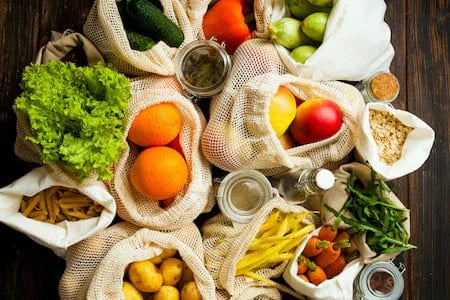Sustainable Diet Tips: How to Eat Healthy While Protecting the Planet

Get news, updates, & event Info delivered right to your inbox:
Key Takeaways: What you eat matters—for the planet and for forests.
- Prioritize plant‑forward and sustainably produced foods: eat more plants, vary your diet, and reduce reliance on resource‑intensive livestock to lower your environmental footprint.
- Reduce waste and resource use in food habits: cut food waste through meal planning, composting, and mindful consumption, and choose local, seasonal, and minimally processed foods whenever possible.
- Choose sustainable sources and packaging: support sustainably sourced seafood and animal products, buy in bulk with reusable bags, and opt for whole, unprocessed ingredients to benefit both health and the planet.
Sustainable Diet: Eat Healthy, Protect the Planet
There’s a lot of data about the role our diet plays in our environmental footprint. The food you eat has a bigger environmental impact than you might realize, but by adopting a sustainable eating plan, you can make meaningful improvements. Your diet is a personal choice, but cooking sustainable meals can be both simple and delicious. We’ve created an easy-to-follow sustainable diet guide to help you get started.
What is a Sustainable Diet?
A sustainable diet is one that's vibrant, delicious, and good for both your health and the planet. It emphasizes local, seasonal, and plant-based ingredients, while also supporting sustainable farming practices and using fewer resources.
Practical Tips for a Sustainable Diet

1. Eat More Plants
Fruits and vegetables are rich in essential nutrients that optimize our health and typically have a much lower environmental impact compared to meat, dairy, and processed foods. However, some exceptions exist, including fragile produce that is shipped thousands of miles, vegetables grown in protected conditions (like hothouse tomatoes), and resource-intensive foods like almonds and GMO soy. By eating more locally sourced, seasonal produce, you can maximize both health benefits and sustainability.

2. Eat More Variety
Our food choices are harming both our health and the planet: 75% of the global food supply comes from just 12 plant and 5 animal species. This lack of variety in our diets exerts pressure on critical ecosystems and threatens global food security. To create a more nutritious, flavorful, and eco-friendly meal, try building colorful plates filled with a variety of whole foods. And don’t be afraid to try unique, locally available ingredients!

3. Reduce Your Food Waste
One-fifth of the food that is produced for human consumption is lost or wasted globally. This loss and waste generates up to 10% of global greenhouse gas emissions—nearly five times that of the aviation sector. To help reduce waste, try meal planning to narrow down your purchases to only what you’ll eat before it spoils, composting your scraps, and freezing or preserving anything you won’t use immediately.

4. Eat Less Animal Products
Raising livestock for human consumption generates around 15% of total global greenhouse gas emissions—more than all transportation emissions combined. Still feel like you need animal protein to feel your best? Try confining your consumption of meat and dairy products to just a few days a week. And whenever possible, choose more sustainable options, such as sustainably produced chicken instead of beef, to reduce your environmental footprint.

5. Eat Local and Eat Seasonally
Grow your own organic vegetables or support a local, sustainable farm. Choose in-season ingredients to reduce costs, as storing food beyond its growing season can be resource-intensive. By supporting local farmers, you not only benefit your health but also contribute to your local economy.

6. Avoid Processed Foods
Aside from being bad for your health, processed foods require a lot of resources, and lose most of their nutrients during production. Even brown rice, which is considered a healthier alternative to white rice, consumes large amounts of water. To make more sustainable and nutritious choices, buy whole, unprocessed foods like buckwheat, quinoa, wild rice, unrefined barley, and wheat berries.

7. Choose Sustainably Sourced Seafood
Seafood can be a healthy addition to your diet, but high demand and poor management have resulted in overfishing of popular species like North Sea cod and wild Atlantic salmon. To make more sustainable choices, explore alternatives such as barramundi, wild-caught sardines, or sustainably farmed shellfish. These options are not only delicious but also better for the environment.

8. Give Plant Proteins a Chance
Plant-based proteins, such as beans, pulses, and certain grains, are far less resource-intensive than animal proteins like beef and chicken. They are also heart-healthy and can be easier to digest. For a delicious, sustainable alternative, try swapping lentils for the beef in dishes like tacos or shepherd’s pie—it's a flavorful and filling option that you might just love!

9. Buy in Bulk
Proper food packaging, especially of meat and seafood, is critical for food safety. But when it is practical, opt for bulk items instead of individually packaged products, bring reusable shopping and bulk bags to the store, and choose products with sustainable packaging materials to help minimize waste
We hope this list has inspired you to make your diet more sustainable! Ready to take your eco-efforts further?
Get news, updates, & event Info delivered right to your inbox:
Related Posts
Agroforestry Explained: Principles, Benefits, and Case Studies
08/01/2026 by Meaghan Weeden
Plant Your Resolution: Making a Global Impact With The Grove
01/01/2026 by One Tree Planted
Trees & Oxygen: How They Produce It, How Much They Make, and Why It Matters
30/12/2025 by One Tree Planted
Popular On One Tree Planted
How to Reduce Waste: 21 Practical Zero Waste Tips for Everyday Living
23/12/2025 by Meaghan Weeden
Inspirational Quotes About Trees
16/12/2025 by Meaghan Weeden
The 9 Oldest, Tallest, and Biggest Trees in the World
11/12/2025 by One Tree Planted
Fundraising Disclosures

Be Part of the Restoration Movement
The Grove is more than just a monthly giving program: it's a vibrant community of individuals who are dedicated to reforestation and environmental restoration on a global scale.





